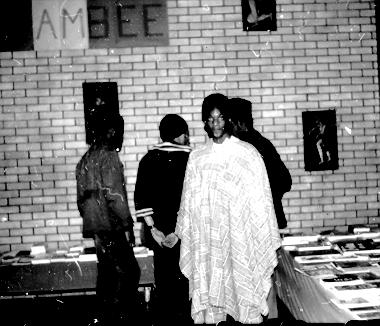Wolverhampton Black History
The Road Towards Black History Month in Wolverhampton
In 1960s Wolverhampton the Afro Circle organisation stressed the importance of teaching the contributions of ancient African Civilizations to humanity. Theirs was a Pan Africanist approach to Black history continued by the Harambee Association that organised the town’s first African-Caribbean Cultural Weekend in October 1978. Organisations like Harambee and the West Indian Family Association (WIFA) set up the Steve Biko Saturday School and the WIFA Summer School, respectively. These supplementary education projects strove to support Black pupils in the core subjects, and to raise awareness of their history and culture.
The establishment of the Afro Caribbean Society at the Polytechnic Wolverhampton during the late 1970s and early 1980s heralded a new era in promoting Black history and culture in Wolverhampton. African Caribbean and African students brought independent Black Theatre to Wolverhampton. The society held public talks on Black History, bringing respected academics and historians such as Dr. Horace Campbell to Wolverhampton; Black Film events and debates and cultural icons such as Linton Kwesi Johnson and Aswad. The work of the Society influenced the development of the independent film studio Vokani, which itself evolved into what we know as the Light House today.
As early as 1974 young Black people began to bring Black history into local schools. Several English Language essays focused on aspects of Black history – from Africa’s place in world civilization to the barbarity of the Trans Atlantic Slave Trade. In 1979 the first educational project by a student on Sickle Cell Anaemia was completed.
Renown artists Eddie Chambers and Keith Piper used their artwork to challenge racism and to promote recognition of Black History. The artists held a pioneering exhibition in the Town Centre during the 1980s.
During Caribbean Focus 1986, key organisations seized any opportunity to bring African Caribbean culture and history into the classroom. Workers at the Wolverhampton Rasta Progressive Association (WRPA) produced educational material on the flora, fauna, folklore and history of the Caribbean. WRPA workers taught classes at local primary schools.
In 1998 individuals from the community of Wolverhampton came together and formed a Windrush Committee to organise a local event in celebration of the 50th Anniversary of the landing of the Empire Windrush at Tilbury, which carried a significant number of African-Caribbean migrants to Britain. This event was an overwhelming success and was featured prominently on TV and broadcasted on the radio. This Committee together with the Senior Policy and Equality Officer of Wolverhampton Council was then successful in getting other organisations from the community, voluntary and statutory sectors in organising and celebrating Wolverhampton’s first Black History Month in 2000.
Prior to 2005 no emphasis was placed on celebrating Black achievement in Britain or Wolverhampton. Black history displays focussing on achievers and history makers highlighted the achievements of African Americans primarily and Black people from other parts of the world. The Black Local History & Cultural Archives Project (BLHCAP) led the way through exhibitions focussing on Black British and Black Wulfrunian pioneers respectively. In 2005 the BLHCAP brought together in partnership organisations operating in the Pendeford area (Pendeford BHM Steering Group) to organise a summer of Black history events and to engage young people in developing an exhibition based on Black British role models. The exhibition: ‘Celebrating Black British Achievement’ was the first of its kind in Wolverhampton, to focus entirely on Black British achievers. Today Black British and Black Wulfrunian history makers and achievers are remembered during Black History Month.
Black History Month in Wolverhampton stands apart from Black History Month across the country. The original BHM brochure/magazine has ceased to be a listings brochure. It is now an annual magazine which not only lists local events, but contains educational content. Black History Month in Wolverhampton is placing a greater emphasis on raising awareness and learning.
The Relevance of Black History Month Today
A people now forgotten, discovered, while others were yet barbarians, the elements of the arts and science. A race of men, now rejected from society for their sable skin and frizzled hair, founded on the study of laws of nature those civil and religious systems which still govern the universe. Count C. Volney - French historical researcher
Black history has yet to feature consistently in the teaching of history in schools. It is still absent from mainstream history books. If you visit a bookshop you may see a book or two about some Chinese, Indian or Pre-Columbian American civilization. You will not find a book about an ancient civilization of Sub-Saharan Africa. This is why Black History Month is still relevant today.

Black History Month has inspired other cultures and communities in Britain and around the world to follow suit. Today in the USA there is also Filipino American History Month, Irish-American Heritage Month, Puerto Rican Heritage Month, National Tibetan American Heritage Month, Jewish American Heritage Month and South Asian History Month. In Britain there is Gypsy and Travellers History Month, LGBT History Month and Anglo Sikh Heritage Week taking place annually in the month of September.
When Should We Celebrate Black History Month?
Not everyone agrees with the concept of a Black History Month, or ‘Negro History Week’ as Malcolm X referred to it:
Next month they’ll come up to show you another trick. They’ll come at you and me next month with this Negro History Week, they call it. This week comes around once every year. And during this one week they drown us with propaganda about Negro history in Georgia and Mississippi and Alabama. Never do they take us back across the water, back home.
Many see the relegation of Black history to one month of the year much in the same way as Malcolm X saw it as a trick. They are right. Black History Month in Britain was organised by local authorities and universities to tick the box that said they are doing their thing to tackle racism and to promote cultural diversity.
Organisations used and still use Black History Month to further their causes and to promote their policies. In most cases no emphasis is placed on Black history or Black history education.
This in turn has led to Black History Month across Britain becoming a multi cultural festival and an opportunity for causes not related to Black History to have a platform.
Black History Month events in areas where a local authority holds the reins can be an opportunity for anyone to get free publicity for staging an event, whether or not that event was relevant to Black History.
The list includes dances, comedy, disaster relief fundraisers, mental and sexual awareness workshops, health promotion events, LBGT events, Khurdish refugee events, Diwali events.
Little or no emphasis is placed on using Black History Month as a time to lobby politicians, engage with educationalists, engage with Black people and work positively toward a proper reintroduction of Black historical truths in a white majority society. Little effort is made to ensure Black history is dealt with all year round. Many organisers, including Black community groups leave it to the last minute to begin thinking about what they are going to do in Black History Month, and if they do anything they convince themselves that they have done their lot to promote Black history. Instead they have participated in a sham exercise.
In 2012 the Wolverhampton Black History Month Brochure carried an article about the ancient manuscripts and monuments in Timbuktu, which were being systematically destroyed by Islamic extremists. The article called on its readers to lobby their politicians calling on the British state to take action to protect these valuable treasures. That is how Black History Month should be used. It is the time in Britain when Black history is in the national domain and a time to take advantage of that profile to ensure Black history is taken seriously by the state and society.
February is the month in which Black History is celebrated in the U.S.A. and most other countries were celebrations are held. The reasons for designating October as Black History Month in Great Britain and the United Kingdom is unclear. The celebration of Black History Month in October is entrenched in Britain.
In recent years some people have argued that Black History Month in Britain should be moved from October to February. In Harrow Black History Month is now celebrated in February. In Wolverhampton some have attempted unsuccessfully to make a similar change.

The debate for people in Britain should not be whether or not Black History Month switches from October to February; but what month is best placed to celebrate Black History Month. Black people of African descent in Britain need to form their own consensus. The general consensus may be that neither month is appropriate for Britain. That is a consensus that could only be reached after proper, informed debate on a national scale.
To move forward with Black History Month, Black people in Britain need to take a lead in determining its future. They need to take a leading role in campaigning for an end to the discrimination that still keeps Black history out of the mainstream. That still lives on racial stereotypes and myths about Black that is borne out of an absolute ignorance of their history and contribution to human civilization past and present.
Black African culture set for the whole world an example of extraordinary vitality and vigor. All vitalist conceptions, religious as well as philosophic, I am convinced, came from that source. The civilization of ancient Egypt would not have been possible without the great example of Black Afrikan culture, and in all likelihood it was nothing but the sublimation thereof. [Prof. Georges Gurvitch, Sorbonne, Message to the Second Convention of Black Writers and Artists, Rome, April 1959]Revised 3rd August 2016







